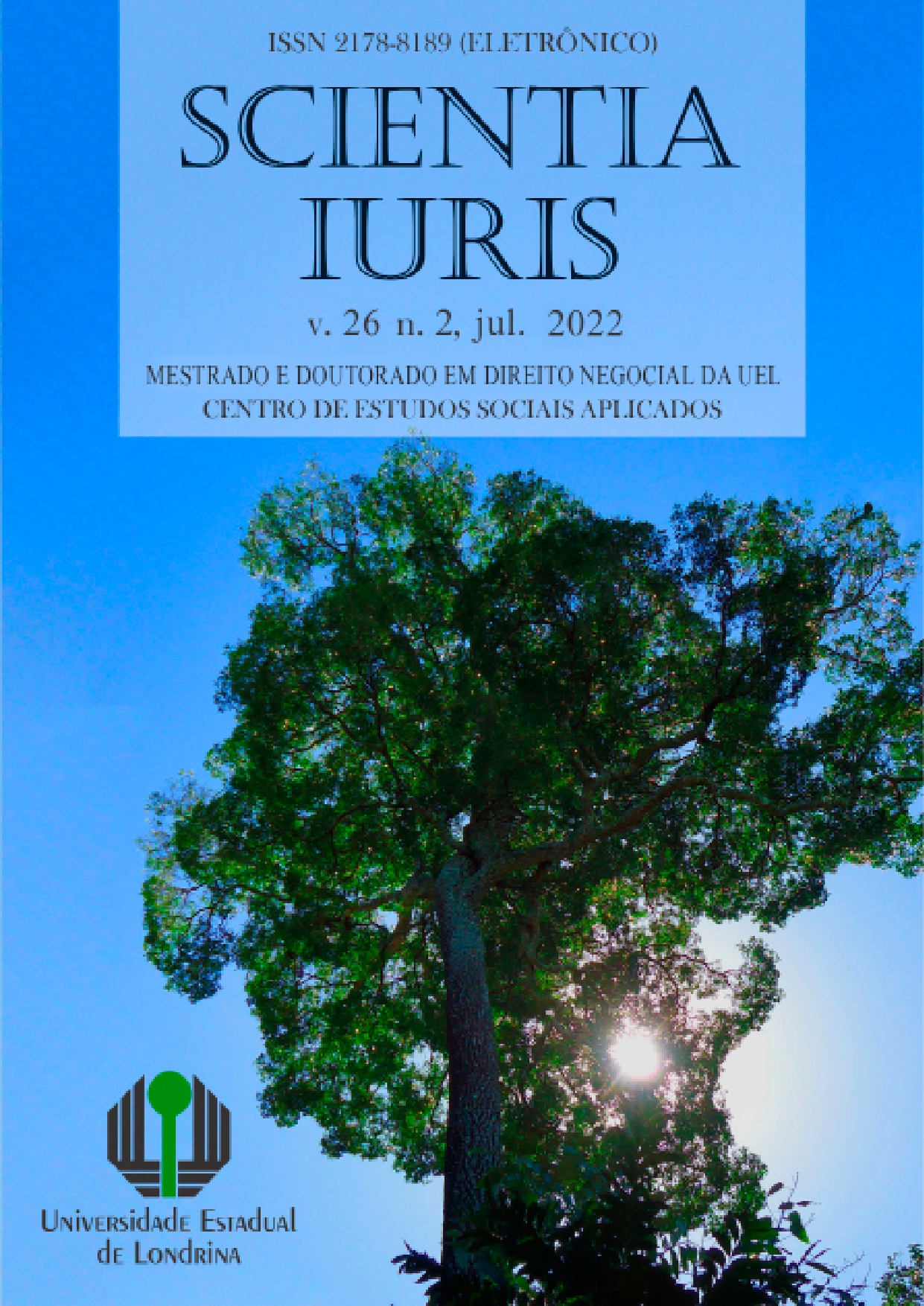Consumer relations and the controversies of the principle of the good faith in the paradigm of the Constitution of 1988
DOI:
https://doi.org/10.5433/2178-8189.2022v26n2p24-43Keywords:
Good Faith. Consumer. Company. Free Competition.Abstract
Consumer protection and free competition are guiding principles of the Constitutional Economic Order, provided for in article 170, items IV and V of the 1988 Charter. It follows that if, on the one hand, the company, anchored in free competition, must improve its costs, transparency and competitiveness to provide more favorable conditions for consumers, on the other hand, the consumer, who has the specific legal status that protects him, must act in good faith to seek the tutelage he intends to live up to. In this section, along with the aforementioned principles of economic order, the focus will be on objective good faith, which, although not expressly provided for in the Brazilian Federal Constitution, can be found in the Civil Code and the Consumer Defense Code. From this principle, the relevance of this discussion in the relationship between the company and the consumer will be pointed out: better explaining, the work will be developed with a view to demonstrating that good faith is the guiding principle of the company's conduct, but also the consumer. All this in a necessary comparison with the constitutional paradigm of 1988 that, in fact, brought to its heart the protection of the consumer, without, however, forgetting the protection of the business, guaranteeing the defense of the competition. The research will be bibliographical with data collection in scientific material and analysis of current concrete cases.
Downloads
References
ALMEIDA, João Batista de. A Proteção Jurídica do Consumidor. 2.ed. rev. atual. e amp. São Paulo: Saraiva, 2000.
BONATTO, Cláudio; MORAIS, Paulo Valério da Paes. Questões Controvertidas no Código de Defesa do Consumidor. Porto Alegre: Livraria do Advogado: 2010.
BRASIL. Código Civil. 20. ed. Curitiba: Juruá. 2009.
BRASIL. Constituição (1988). Constituição da República Federativa do Brasil. Brasília, DF: Senado Federal.
BRASIL. Lei nº. 8.078, de 11 de setembro de 1990. Código de Defesa do Consumidor. Dispõe sobre a proteção do consumidor e dá outras providências. Disponível em: http://www.planalto.gov.br/ccivil_03/Leis/L8078.htm
BRASIL. Lei 10.406, de 10 de janeiro de 2002
CAMPOS, Norma Sônia Novaes. A evolução da Sociedade, o Código de Defesa do Consumidor e Liberdade. Disponível em <https://www.conpedi.org.br/publicacoes/9105o6b2/q6fgxq0m/jfokbi7854cD3cP4.pdf> Acesso em julho de 2018
CAVALIERI FILHO, Sérgio. Programa de Direito do Consumidor, 3a Ed, São Paulo: Atlas, 2011.
FIGUEIRA, Divalte Garcia. História. São Paulo: Ática, 2001. p. 198. Volume Único.
GAUDÊNCIO, Aldo César Filgueiras. (Hiper)proteção contratial do consumidor: consolidação da defesa dos consumidores hipervulneráveis no direito brasileiro. Disponível em <https://www.conpedi.org.br/publicacoes/y0ii48h0/1q6l85u4/Z1s747s6O3mJNRCv.pdf>Acesso em julho de 2018.
INTERNET. http://www.dhnet.org.br/direitos/anthist/hamurabi.htm. Acesso em 17 de julho de 2018.
MARQUES, Cláudia Lima. Contratos no código de defesa do consumidor: o novo regime das relações contratuais. 4a. ed. São Paulo: Revista dos Tribunais, 2002.
MARTINEZ, Ana Paula. A proteção dos consumidores pelas normas concorrenciais. São Paulo: Revista de Direito do Consumidor, v. 13, n. 52, p. 7-36, out.-dez. 2004.
MARTINS-COSTA, Judith. A boa-fé no direito privado: sistema e tópica no processo obrigacional. São Paulo: RT, 2000.
MESSA, Ana Flávia; TEOPHILO JÚNIOR, Roque. Estado e Economia: estudos em homenagem a Ademar Pereira. In: PIRES, Antonio Cecílio Moreira; PIRES, Lílian Regina Gabriel Moreira. A ordem econômica brasileira e as microempresas e empresas de pequeno porte. São Paulo: Saraiva, 2011.
NALIN, Paulo Roberto Ribeiro (coord.). Contratos & sociedade: princípios de direito contratual. Curitiba: Juruá, 2006.
NEGREIROS, Teresa. Fundamentos para uma nova interpretação constitucional do princípio da boa-fé. Rio de Janeiro: Renovar, 1998.
NISHIYAMA, Adolfo Mamoru. A proteção constitucional do consumidor. 2ª. Ed. rev., atual. e ampl. São Paulo: Atlas, 2010.
NORAT, Markus Samuel Leite. Evolução histórica do Direito do Consumidor. In: Âmbito Jurídico, Rio Grande, XIV, n. 88, maio 2011. Disponível em: <http://www.ambitojuridico.com.br/site/index.php?n_link=revista_artigos_leitura&artigo_id=9474>. Acesso em jul 2018.
PETTER, Lafayete Josué. Direito econômico. 5. ed. atual. ampl. Porto Alegre: Verbo Jurídico, 2011. 461 p. (Série Concursos).
SANSEVERINO, Paulo de Tardo Vieira. Responsabilidade civil no Código de Defesa do Consumidor e a defesa do fornecedor. São Paulo: Saraiva, 2002.
SIDOU, J. M. Othon. Proteção ao consumidor. Rio de Janeiro: Forense, 1977
SILVA, Clóvis do Couto e. O princípio da boa-fé e as condições gerais dos negócios. In: Anais Jurídicos. Curitiba: Juruá, 1988.
SLAWINSKI, Célia Barbosa Abreu. A trajetória da boa-fé objetiva no direito brasileiro. Disponível em: http://jus.com.br/artigos/3120/a-trajetoria-da-boa-fe-objetiva-no-direitobrasileiro. Acesso em: julho de 2018.
Downloads
Published
How to Cite
Issue
Section
License
Copyright (c) 2022 Scientia Iuris

This work is licensed under a Creative Commons Attribution 4.0 International License.
The journal reserves the right to modify, in the original text of the submitted article, normative, spelling and grammatical mistakes in order to maintain the cultured standard of language and the credibility of the journal. The journal will respect the authors' writing style. Changes, corrections or suggestions of conceptual order will be sent to the authors, when necessary. In such cases, the articles will be re-examined. The final exams will not be sent to the authors. The published works become the property of the journal, in other words, its total or partial reprinting is subject to the express authorization of the journal. In all subsequent citations, the original source of publication shall be cited and in the case of Photographic Speeches, shall be approved by the original author. The opinions expressed by the authors of the journal's articles are of their sole responsibility.

















